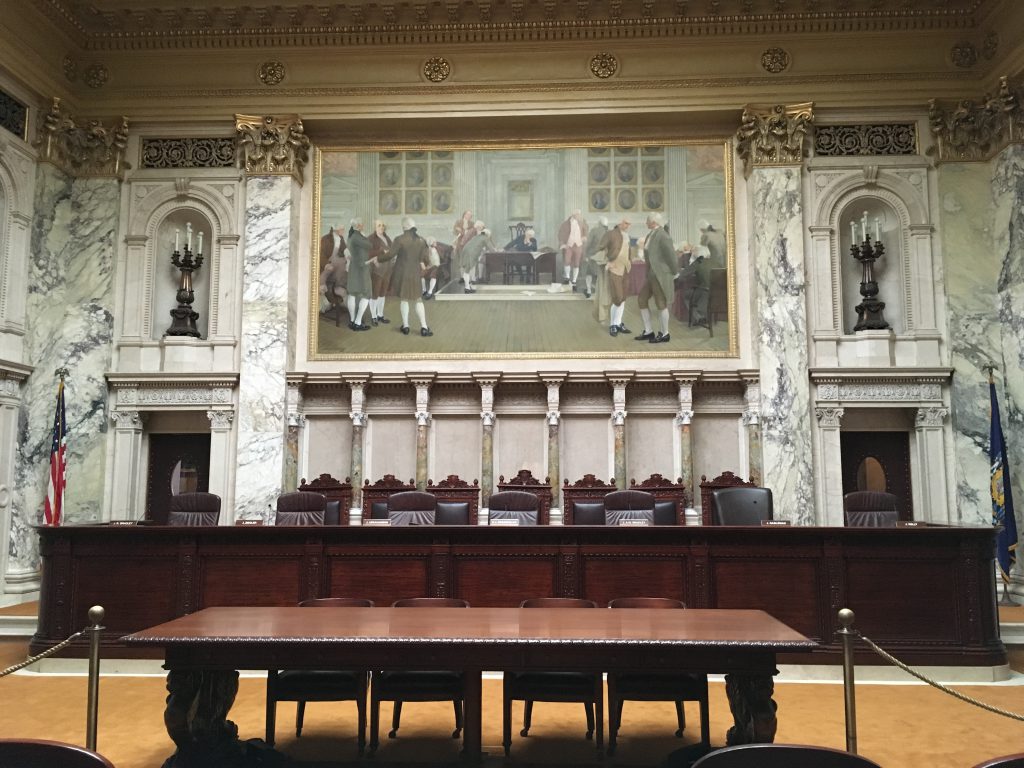The Imperial Legislature Is Shot Down
6-1 decision by Wisconsin Supreme Court a surprise. What does it tell us about the court?
At first glance, the most surprising thing about the Wisconsin Supreme’s decision in Evers v. Marklein is the identity of the opinion’s author. Justice Rebecca Grassl Bradley normally acts as a right-wing firebrand. During the pandemic, she accused Wisconsin’s state and local public health officials of acting like dictators.
Under examination was a section of state law that gave the Legislature’s Joint Committee on Finance a veto over conservation projects selected by the Department of Natural Resources (DNR) under the Knowles Nelson Stewardship Program. Apparently, any committee member can put a hold on a project and there is no requirement that the committee act within a certain time. And the public is not privy to the identity of the member who blocked the action.
In addition to the language in the Knowles Nelson authorization, Governor Tony Evers also challenged similar requirements in several other programs:
- The Legislature’s Joint Committee on Employment Relations blocked pay raises for Universities of Wisconsin employees demanding that UW eliminate its diversity, equity and inclusion (DEI) programs.
- The Joint Committee for Review of Administrative Rules vetoed rules developed by the Department of Safety and Professional Services to update the state’s commercial building standards.
- The same committee has blocked efforts by the Marriage and Family Therapy, Professional Counseling, and Social Work Examining Board to update ethics standards for social workers, marriage and family therapists, and professional counselors.
Gov. Evers, represented by Attorney General Josh Kaul, challenged these provisions on the basis that they violated the principle of separation of powers. The U.S. Constitution and the Wisconsin Constitution both set fourth three branches of government with separate and distinct powers: the legislative charged with writing and passing laws, the executive charged with implementing the laws, and the judicial charged with resolving disputes.
As described in a previous Data Wonk post, one of the projects blocked by the joint committee was a grant to the Ozaukee Washington Land Trust to help purchase and develop as a nature preserve the Clay Bluffs – Cedar Gorge site on Lake Michigan south of Port Washington in Ozaukee County. Although the committee refused to identify which legislator had requested the hold or why it was made, scuttlebutt is that it was made at the request of a developer who hoped to build luxury housing overlooking the lake. Eventually, Evers used federal grant money not under the control of the Legislature to purchase the land.
The separation of powers theory is most commonly associated with James Madison and his Federalist Papers. For example, here is Madison in Federalist 47:
The accumulation of all powers, legislative, executive, and judiciary, in the same hands, whether of one, a few, or many, and whether hereditary, self-appointed, or elective, may justly be pronounced the very definition of tyranny. … The preservation of liberty requires that the three great departments of power should be separate and distinct.
The separation of powers doctrine says that once legislation is enacted its implementation is up to the executive. If a majority of the Legislature disagrees with how the executive implements a law, it can amend the law. That, of course, would require that a majority of the Legislature vote for the change, as well as approval from the governor or a super majority to overcome the governor’s veto.
As the majority opinion states:
We conclude these statutes interfere with the executive branch’s core function to carry out the law by permitting a legislative committee, rather than an executive branch agency, to make spending decisions for which the legislature has already appropriated funds and defined the parameters by which those funds may be spent. A statute authorizing the legislative branch to exercise core powers of the executive branch violates the constitutional separation of powers and cannot be enforced under any circumstances.
Yet, it would be a mistake, I think, to conclude that the fact that six justices joined the Bradley opinion means that collegiality reigns supreme on the court. Rather, this probably reflects a one-time temporary convergence of interests and beliefs. This is reflected in the concurrences and that accompany the opinion. While the term “concurrence” implies agreement, in practice it becomes the place to put all the things the author wished to say but omitted knowing that their inclusion would have destroyed the majority’s agreement.
She then joins Chief Justice Ziegler in accusing Justices Dallet, Walsh Bradley, Karofsky, and Protaswiecz of favoring the executive over the judicial. Anyone expecting that an opinion supported by six of the seven justices to presage a more collegial Supreme Court is likely to be disappointed.
Simultaneously with the release of its decision, the court asked that the parties file legal memoranda by July 26, 2024, discussing the impact of today’s decision, if any, on whether the court should grant review of the other challenges to legislative power included in Kaul’s brief. We’ll see what happens.
Data Wonk
-
Life Expectancy in Wisconsin vs. Other States
 Dec 10th, 2025 by Bruce Thompson
Dec 10th, 2025 by Bruce Thompson
-
How Republicans Opened the Door To Redistricting
 Nov 26th, 2025 by Bruce Thompson
Nov 26th, 2025 by Bruce Thompson
-
The Connection Between Life Expectancy, Poverty and Partisanship
 Nov 21st, 2025 by Bruce Thompson
Nov 21st, 2025 by Bruce Thompson























Conservatives believe that any and all regulations are bad. However, Adam Smith, the father of capitalism, wrote that regulations that protect those with the least resources from the power of the wealthiest ARE necessary. He saw government as essential to ensure the prosperity of everyone including those who toil “to feed, clothe, and shelter” the rest of society; in other words, the working class.
Smith was an equalitarian who believed that capitalism was the best way to counteract the excesses of Feudalism and Mercantilism (the preceding economic systems). He believed that a “free market” enabled all–labor and management–to compete on an equal footing. Our Founding Fathers agreed with Smith and went further to ensure government belonged to all citizens; not just those who could pay off corrupt politicians.
…Or hire high priced, flannel-mouthed lawyers talented an twisting the laws intent to favor his client. Nice work Mr Wagner!!